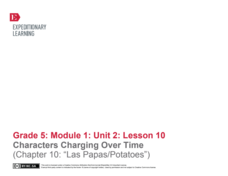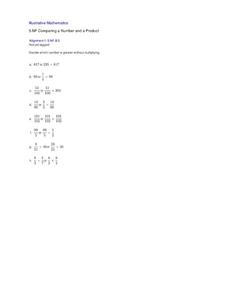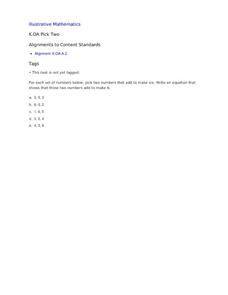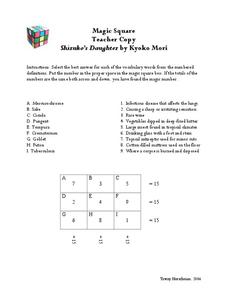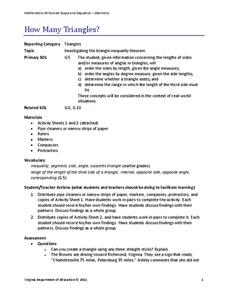Curated OER
Magic Squares for Cyrano de Bergerac Act II
There is some tricky vocabulary in Act II of Cyrano de Bergerac! Front-load these words with this magic squares activity. Sixteen new words are listed, along with their definitions. Kids must match each word to its definition, completing...
Curated OER
Things Fall Apart: Vocabulary
What is a magic vocabulary square? Use this newly popular method of reviewing vocabulary to engage your class. There's some tricky vocabulary in Things Fall Apart; front-load words like impending, impudent, and pacified to ease the...
EngageNY
Characters Changing Over Time (Chapter 10: "Las Papas/Potatos")
Engage further in Esperanza Rising with a focus on close reading and metaphor. Class members zero in on the tenth chapter, examining characters and big ideas. Pupils discuss the text in small groups and as a whole class, and participate...
Curated OER
Comparing a Number and a Product
Mental math strategies are important for fifth graders to be able to determine the greater sum without actually solving the equations. As a summative assessment, this eight-problem worksheet can give insight into the understanding of the...
Illustrative Mathematics
Adding Multiples
Mathematicians practice communicating why the sum of two multiples of a number results in another multiple of that number. Encourage learners to construct a viable argument by applying the distributive property or by drawing a diagram....
Curated OER
A Lifetime of Savings
Sometimes people who seem to lead what would be considered an ordinary life do extraordinary things. Such was the case with Oseola McCarty, who donated a large sum of money for a university scholarship fund in her name. Oseala lived her...
Chapman University
e Poster
An interesting poster or handout showing Euler's number, e, as the calculated sum of an infinite series. The fractions start out large and gradually get smaller and smaller in both value and size. Shows some of the unique and fascinating...
Illustrative Mathematics
Pick Two
Learning to break apart numbers into smaller pairs is a critical step young mathematicians take as they develop their number sense. To practice this skill, children are provided with sets of three numbers and are asked to pick the two...
McGraw Hill
Adding and Subtracting Mixed Numbers
Adding and subtracting mixed numbers will be a breeze with this guided instructional activity packet. Learners work through examples outlining each step including rewriting mixed numbers as improper fractions, adding numerators, and...
Collaborative Learning Project
Four in a Row Addition and Subtraction
Scroll down to find four fun addition and subtraction partner game boards, complete with endless opportunities for practice with numbers 0-38. Kids choose numbers from a number box and, depending on the game, either find the sum or the...
Curated OER
Shizuko’s Daughter: Magic Square
Vocabulary really adds up with magic squares! Using words from Shizuko's Daughter by Kyoko Mori, kids line up words and definitions to come up with the same sum across and down the square.
Common Core Sheets
Adding and Subtracting Percents and Decimals
Seventh graders are challenged to find the sums and differences of percents and decimals. But first, pupils must find the value of the percent in order to add/subtract it from the decimal.
Computer Science Unplugged
Card Flip Magic—Error Detection and Correction
I can find the error in an array of cards? After watching a demonstration class members search for the error is the provided cards. The resource provides a real-life example of using ISBN numbers in error detection and using check sums.
Computer Science Field Guide
Computer Science Field Guide
Imagine computer science all summed up in one book. This resource provides 16 chapters that cover many aspects of computer science, ranging from algorithms to software engineering. The e-book contains links to applets to help explain...
Mathematics Assessment Project
Cross Totals
Finally, it all adds up. Learners complete a number puzzle in which they investigate the sums of the digits one through nine in a cross pattern. They then try to determine what totals are possible and which ones are not before devising a...
EngageNY
Mastering Factoring
Math class is full of drama—there are so many problems to work out! Pupils work out factoring problems. They use quadratic methods of factoring higher degree polynomials, in addition to factoring the sum and difference of two cubes.
Mental Arithmetic
Number Bonds to 10
First graders solve the sums up to 10 using the mental math strategy of number bonding. Thirty different addition facts on the worksheet allow for plenty of practice.
EngageNY
Putting the Law of Cosines and the Law of Sines to Use
Use the Law of Cosines and the Law of Sines to solve problems using the sums of vectors. Pupils work on several different types of real-world problems that can be modeled using triangles with three known measurements. In the process,...
Mathed Up!
Angles in Triangles and Quadrilaterals
This short video show viewers how to connect the sum of the angles in a triangle to other angle measurements. Pupils determine the missing measures for angles involved with triangles and quadrilaterals. Class members then must explain...
Virginia Department of Education
How Many Triangles?
Something for young mathematicians to remember: the sum of any two sides must be greater than the third. Class members investigates the Triangle Inequality Theorem to find the relationship between the sides of a triangle. At the same...
EngageNY
Estimating Probabilities by Collecting Data
Take a spin to determine experimental probability. Small groups spin a spinner and keep track of the sums of the spins and calculate the resulting probabilities. Pupils use simulated frequencies to practice finding other probabilities to...
EngageNY
Even and Odd Numbers
Even or not, here I come. Groups investigate the parity of products and sums of whole numbers in the 17th lesson in a series of 21. Using dots to represent numbers, they develop a pattern for the products of two even numbers; two odd...
EngageNY
Divisibility Tests for 3 and 9
Who knew the sum of a number's digits gives such interesting information? The 18th installment of a 21-part module has scholars investigate division by three and nine. After looking at several examples, they develop divisibility tests...
CK-12 Foundation
Multiplying Matrices by a Scalar
The rule is add before multiplying, even with matrices. Pupils use a slider to change the scalar multiplying the sum of two matrices. The interactive displays the resulting solution matrix, and requires scholars answer five questions...
Other popular searches
- Estimating Sums
- Estimating Number Sums
- Partial Sums
- Sums of 10
- Addition Partial Sums
- Sums of 8
- Sums to 5
- Estimating Sums Differences
- Calculating Sums
- Estimating Sums of Fractions
- Color by Sums
- Multiplication Sums




